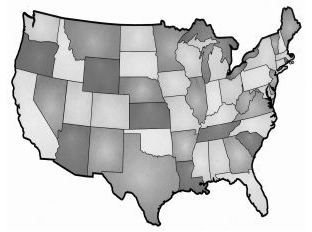Which States Have Strict Home Schooling Rules & Regulations and Which Ones Don't
The first thing I did when I wanted to homeschool was check out my states rules and regulations. I am lucky because I live in New Jersey which is a liberal homeschooling state. There are only two requirements for me and that is to teach “The History of New Jersey” and to homeschool for 180 days each year. If I should ever choose to put my daughter in to a public or private school in the area I am not required to show any proof at all and she would just be accepted in to whichever grade I told them she was in. Not all states are this liberal. Please read below to find out which regulations your state follows:
The Most Liberal States: These are states that require no notice of intent to homeschool. Parents do not even have to let anyone know what they are doing. Most require you to homeschool for 180 days. These states are New Jersey, Connecticut, Michigan, Indiana, Illinois, Missouri, Oklahoma, Texas, Alaska, Idaho, and Ioawa.
Semi-Liberal States: These states require parents to notify them if they are going to homeschool their children. Other than that they really don’t have any rules and regulations. The states in this category are Delaware, Mississippi, Alabama, Kentucky, Wisconsin, Nebraska, New Mexico, Kansas, Arizona, Utah, California, Nevada, Wyoming, Montana, Nebraska and Georgia.
Slightly Strict States: These states require parents to do much more than give notification of intent to homeschool. Parents must keep track of all the students tests and submit them. They must also submit to evaluations of their child’s progress. These states are New Hampshire, Maine, Oregon, Washington, Florida, North Carolina, South Carolina, Virginia, West Virginia, Hawaii, Ohio, Tennessee, Louisiana, Arizona, Maryland, District of Columbia, Minnesota, South Dakota, North Dakotoa, and Colorado.
Very Strict States: These states have the most requirements for homeschooling. Parents must comply. They need to give notification, get their curriculum approved, submit to testing or home evaluations, and some even require parents to have teaching degrees. The states that fall in to this category are: Vermont, New York, Pennsylvania, Rhode Island, and Massachusetts.
You can use the above categories as guides, but you should call your local public schools to find out specifically what your state requires. If they don’t know (but they should) then they can give the number of the person who does.
